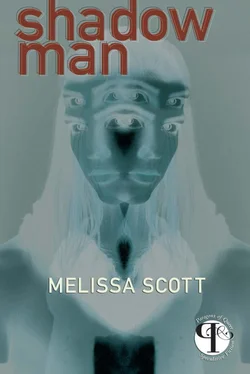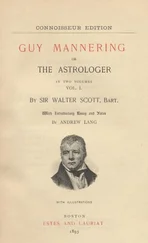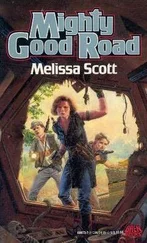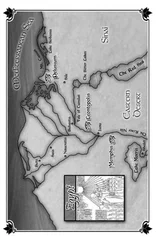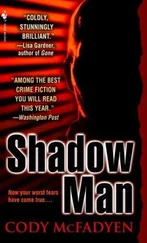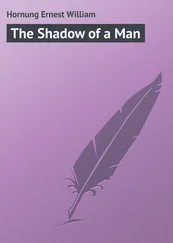They left the coupelet behind them quickly, walking with the flow of the crowd toward the Glassmarket’s open hexagonal plaza. Six blocks away, Warreven could hear the beat of the drums and the shrill two-toned call of flat-whistles; as they got closer, it was all he could do to keep from dancing with them. Ahead of him, a woman—no, he thought, a fem—in tunic and trousers broke into a quick skipping step, and the men with her laughed and applauded. She bowed, too deeply, and her shaal slipped, so that she had to snatch it up from the dust, and nearly overbalanced in the process. One of the men caught her, still laughing, and as she spun in his arms, Warreven saw her eyes white and staring, and the mark of Genevoe on her face. She was already flying, high on hungry-jack or sundew, the Trickster’s own drugs, and Warreven glanced curiously at Folhare, wondering if this was part of the planned presance .
Folhare saw the look and leaned close, her words all but drowned in the genial noise of the people around them. “No, she’s not, and I don’t thank you for thinking it. Ours is to be done stone sober, or—certain people—will know why.”
Easier said than done , Warreven thought, but they had reached the edge of the Glassmarket, and he caught his breath in startled delight. Even expecting it, even having seen it before, the sight of the Glassmarket filled with Stillers—all his kin, in some way, all somehow family—was enough to make him momentarily glad of his allegiance, and for an instant he could almost look forward to his time as seraaliste . Normally, the sunken floor of the market was filled with vendee , market folk who had held their spots for generations. Some still sold glass, though not as many as before, and on a clear day the center of the market glittered like flame, sunlight sparking from finished goods and the rods and spheres of raw glass sold to other craftsmen. The Madansa, the spirit of the markets, painted on the wall of the warehouses overlooking the marketplace carried spheres of glass in each hand and wore a glass crown on her braided hair. There had been a field of glass under her feet, but sun and hands, touching the images for luck, had worn away the paint.
The character of the market had changed, anyway. The lesser vendee —the majority, now—sold fabrics, clothes, and quilted coverlets to a mix of indigenes and off-worlders. A few, the upstarts who held spaces along the perimeter, sold off-world goods, but most of that trade was confined to the Harbor Market and the Souk. Tonight, however, and for the next two days, the stalls and carts had been hauled away, and the plaza was filled with people instead. Their silks glowed under the massive lights, haloed and refracted by the creeping star’s effects; the same light glittered from glass and shell jewelry, and gleamed from the ribbons that tied the wreaths of flowers. Beyond the crowd stood the platform where the Important Men and Women, clan officers and heads-of- mesnie , would stand for the announcements, and below them, mostly hidden by the mass of people, were the tables of the baanket itself. The cooks and tenders—there would easily be a hundred of them, probably more—were invisible, too, but the smell of the food proved their presence. The weigh platform, where bulk goods were sold under the eyes of city and clan officials, had been covered over by a temporary staging, and the first of the bands was playing, their music lost except for the drumbeat and the occasional shrilling of the whistles.
“Here,” Malemayn said, and Warreven turned, startled, to seethe other holding out a wreath of catseyes. Lyliwane, laughing at his side, wore two great sprays of the flowers tucked into her crown of braids.
“Æ?”
“For you,” Malemayn said, and set it precariously on Warreven’s head.
“I don’t need flowers,” Warreven said, adjusting it anyway. Looking around, he could see half a dozen other couples wearing them, all officially, passing for men and women, though he thought he saw at least one other herm, and maybe a plump mem, among the group. He scowled, reaching for the wreath, and Malemayn shook his head.
“You’re our seraaliste now, Raven, our very own Important Man. You should be wearing.” He turned to Folhare. “And for you, mirrim.”
Folhare took the wreath he held out to her, slung the bright blue flowers like a necklace across her shoulders. “Where’d you get it? It’s lovely.”
“There was a boy selling them,” Malemayn said, and gestured vaguely toward the crowd behind him. Warreven looked and saw a thin herm holding a basket piled high with greenery. Boy, indeed , he thought, and the flower seller winked at him. He smiled back, temper somewhat restored, and looked away again.
“You’re taking this a little seriously,” Haliday said, but 3e was smiling. Ȝe, too, wore a crown of catseyes, the vivid yellow bright against 3er black hair. “And, speaking of Important Men, you, Raven, should be getting to the platform, I think.”
Warreven made a face, but had to admit 3e was right. The platform was filling up with dignitaries; it was time, he supposed, to take his place with them. He looked to his right, over the heads of the crowd, and saw the windows and narrow balconies of the White Watch House crammed with bright-clad figures: Stanes and their Maychilder kin-by-marriage and the occasional Landeriche or Delacoste, come to watch the Stiller display from an appropriate distance and to judge its probable cost and the clan’s generosity. There were a few duller figures, too, drab among the locals: off-worlders, almost certainly pharmaceuticals, who were Temelathe’s guests. Tendlathe would be there, too. “I hope they enjoy the show,” he said, and held out his hand to Folhare, less as a courtesy than to keep from getting separated in the crowd.
Folhare took it, her fingers cool in his, leaned close again as they started toward the platform. “I guarantee they’ll be—impressed.”
Woman: (Concord) human being possessing ovaries, XX chromosomes, and some aspects of female genitalia; she, her, her, herself.
Tatian stood on one of the narrow balconies of the White Watch House, his shoulder jammed painfully against the coarse brick of the building shell, and wondered if carved ironwood was really strong enough to hold the seven adults who filled its platform. The single child, no older than sixty-nine or seventy kilohours, hardly seemed large enough to count. He pressed himself harder against the bricks as the child wriggled past, disappearing back into the main room, and waved away a faitou offering a tray of feelgood wrapped for stick smoking. The other people crowding the window greeted her gladly, and he winced at the acrid cloud that cloaked the balcony for an instant before the wind carried it away.
“So, Mir Tatian,” a familiar voice said, and Tatian turned awkwardly to face Wiidfare Stane, a glass beaker of liquertie in his hand. “I’m glad you could make it this year.”
“My pleasure,” Tatian answered, and hoped the Licensing Officer couldn’t hear the insincerity in his voice. Wiidfare had invited him every year before, as he invited all the off-world heads-of-station, and every year Tatian had refused—until now. And I wouldn’t be here this time if Reiss hadn’t managed to piss off Stane and involve me in it . The party was a blatant display of Stane’s power—Stanes and off-worlders standing together to lookdown on the celebration of a lesser clan—and Tatian, who did a great deal of business with Stiller mesnie s, had never felt it was entirely wise to attend.
“But you’re not drinking,” Wiidfare said. “Let me get you something.”
Читать дальше
